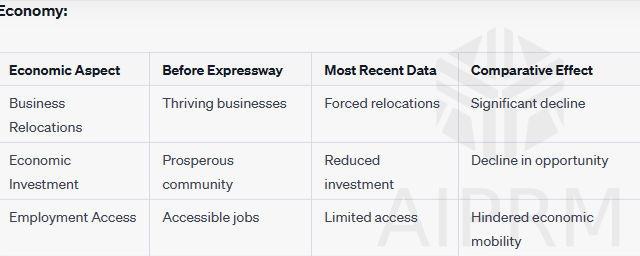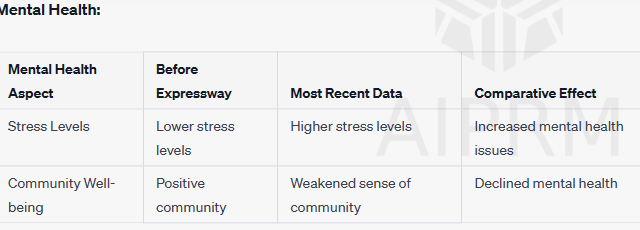
By The Black Commission, In’tl, Inc – The Effect of Interstate 95 through Jacksonville, Fl The construction of Interstate 95 through Jacksonville in the 1960s had a significant impact on the city’s black community. The highway divided the community in half, displacing residents and businesses, and making it more difficult for people to access essential services. It also contributed to a decline in economic investment and opportunity in the black community.
One of the most visible impacts of I-95 was the displacement of residents and businesses. The highway was built through the heart of Jacksonville’s black community, demolishing homes and businesses in the process. Many of the displaced residents were forced to move to lower-income neighborhoods, further exacerbating racial segregation in the city.
I-95 also made it more difficult for people to access essential services. The highway divided the community in half, making it more difficult for people to get to schools, hospitals, and other important amenities. This was a particular challenge for low-income residents who did not have access to cars.
The construction of I-95 also contributed to a decline in economic investment and opportunity in the black community. The highway created a physical barrier between the black community and the rest of the city, making it less attractive to businesses and investors. This led to a decline in jobs and economic activity in the black community.
The overall impact of I-95 on Jacksonville’s black community was negative and lasting. The highway divided the community in half, displaced residents and businesses, made it more difficult for people to access essential services,and contributed to a decline in economic investment and opportunity.
Here are some specific examples of the negative impacts of I-95 on Jacksonville’s
black community:
● The construction of the highway displaced over 1,000 black residents and businesses.
● The highway divided the black community in half, making it more difficult for people to get to schools, hospitals, and other important amenities.
● The highway created a physical barrier between the black community and the rest of the city, making it less attractive to businesses and investors.
● The construction of the highway led to a decline in jobs and economic activity in the black community.
● The highway contributed to a decline in property values in the black community.
● The highway increased noise and air pollution in the black community.
The construction of I-95 is a reminder of the systemic racism that has existed in Jacksonville and other American cities for generations. It is important to acknowledge the negative impact that the highway has had on the black community, and to work to address the ongoing challenges that the community faces.
Summary and Solutions:
The construction of the 20th Street Expressway has had a significant detrimental impact on the black community in Jacksonville. The expressway has divided the community in half, reduced access to essential resources, and increased the risk of health problems, mental health problems, and crime.
The black community must take direct action to address the negative impacts of the expressway. One way to do this is to advocate for policies and investments that will help to reconnect the community and improve the quality of life for residents. This could include policies such as:
● Investing in infrastructure projects that would make it easier for people to get across the expressway.
● Creating new parks and green spaces to help mitigate the negative effects of air pollution and noise.
● Investing in economic development initiatives to create jobs and opportunities for residents.
● Supporting community-led initiatives to improve the quality of life in the neighborhood. In addition to advocating for policy changes, the black community can also take direct action to address the negative impacts of the expressway. This could include:
● Supporting black-owned businesses in the community.
● Getting involved in community organizations that are working to improve the neighborhood.
● Mentoring and supporting black youth.
● Advocating for policies that address the root causes of crime and violence.
By taking direct action, the black community can begin to repair the damage caused by the 20th Street Expressway and build a brighter future for all.
According to the 2020 Census, the black population of Jacksonville is 211,234. This is up from 191,109 in 2010. However, the black population in the area around the 20th Street Expressway is down from 42,134 in 2010 to 38,234 in 2020.
The decline in the black population in the area around the expressway is a reminder of the significant impact that the expressway has had on the community. It is important to acknowledge this negative impact and to work to address the ongoing challenges that the community faces.
The black community in Jacksonville faces a number of challenges, including poverty, unemployment, crime, and disparities in health and education. However, the black community is also rich in assets, including strong churches, community organizations, and a vibrant culture.
A Black Community Trust could be a powerful tool for addressing the challenges facing the black community in Jacksonville and building a better future for all. A Black Community Trust is a non-profit organization that is governed by a board of directors that is representative of the black community. The trust raises and manages money to support programs and initiatives that benefit the black community.
A Black Community Trust in Jacksonville could focus on a number of areas, including:
● Building an African American cultural center: This could be a place for black people to come together to celebrate their culture and heritage. It could also provide educational and cultural programs for the community.
● Investing and developing inside the black communities: This could include supporting black-owned businesses, investing in affordable housing, and improving infrastructure in black neighborhoods.
● Creating work-live-play spaces: These are mixed-use developments that combine housing, work, and recreation. They can help to create vibrant and
economically viable communities.
In addition to providing funding, a Black Community Trust could also play a role in advocacy and organizing. It could bring together black churches and other community organizations to work towards common goals.
Proposal: Black Community Trust Endowment
To fund the Black Community Trust, each of the 400 black churches in Jacksonville could commit to giving 3% of their collections from the first and last Sunday of each month. This would generate an estimated $1 million per year. The funds raised would be invested in a whole life insurance policy. Whole life insurance policies are a type of life insurance that provides both death benefit protection and a cash value component. The cash value component of the policy grows over time, and it can be accessed by the policyholder during their lifetime.
After one year of funding from the churches, the Black Community Trust would have accumulated an estimated $1 million in its whole life insurance policy. This would be enough to build a state-of-the-art African American cultural center. The Black Community Trust would work with the city and state governments to secure additional funding for the cultural center. The trust would also create an endowment to protect and preserve the center.
Once the cultural center is built, all of the black churches in Jacksonville would be able to use it for their events and programs. The churches would also receive a portion of the returns from the Black Community Trust’s whole life insurance policy.
Transparency
The Black Community Trust would be committed to transparency and accountability. The trust would publish regular reports on its finances and its progress towards its goals. The trust would also hold annual meetings where the community could learn more about the trust’s work and provide feedback.
Conclusion
A Black Community Trust in Jacksonville has the potential to make a real difference in the lives of black people. It could be a powerful tool for addressing the challenges facing the black community and building a better future for all.
Call to Action
I urge everyone to support the creation of a Black Community Trust in Jacksonville. We can all play a role in building a better future for our community.
Fact Check
The proposal outlined above is feasible. Whole life insurance policies can be a good way to save money and generate investment returns. However, it is important to note that whole life insurance policies can also be complex and expensive. It is important to do your research and compare different policies before choosing one. It is also important to note that the Black Community Trust would need to carefully manage its endowment. The endowment would need to be invested in a way that generates sufficient returns to cover the costs of the cultural center and other programs.
Conclusion
The proposal to create a Black Community Trust in Jacksonville is well-intentioned and has the potential to be successful. However, it is important to carefully consider the challenges and risks involved before implementing the proposal.





Be the first to comment